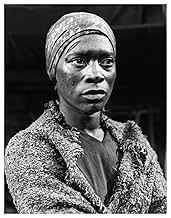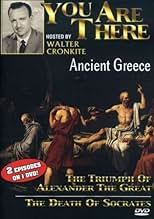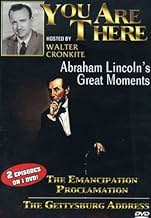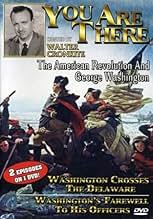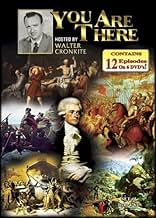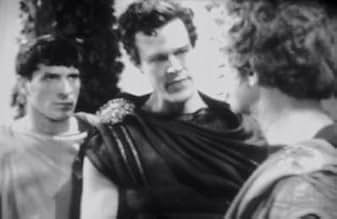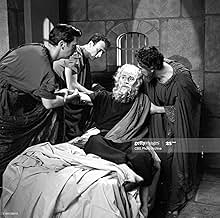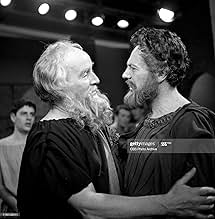Walter Cronkite apresenta as encenações de eventos históricosWalter Cronkite apresenta as encenações de eventos históricosWalter Cronkite apresenta as encenações de eventos históricos
- Ganhou 2 Primetime Emmys
- 3 vitórias e 4 indicações no total
Explorar episódios
Avaliações em destaque
Hosted by Walter Cronkite before his bigger successes, "You Are There" created something totally new for television - a reporter with a camera and microphone who covered historical events as though they were breaking news.
One example was, "The Assassination of Julius Caesar." He interviews many of the people who took part as they stand over Caesar"s body.
"Excuse me, sir," he asks Marc Antony. Antony takes a moment to be interviewed. What a fascinating concept.
The only other episode I remember seeing live was, "The Capture of Jesse James," with an unknown James Dean in the title role.
If the episodes have not been lost, they should be put on DVD for today's generation to watch.
One example was, "The Assassination of Julius Caesar." He interviews many of the people who took part as they stand over Caesar"s body.
"Excuse me, sir," he asks Marc Antony. Antony takes a moment to be interviewed. What a fascinating concept.
The only other episode I remember seeing live was, "The Capture of Jesse James," with an unknown James Dean in the title role.
If the episodes have not been lost, they should be put on DVD for today's generation to watch.
I noticed the one user comment about this show, about seeing it in elementary school in the 1960s. That person seemed to feel the acting wasn't up to par and kids were not too interested.
I remember the series as a teenager in the 1950s when it was on the air for real. Our whole family would watch this show together, and we were as I recall fascinated by it. I distinctly recall one of the shows was on the death of Socrates which even to this day must affect me in some way. Here I was, a teenager, thoroughly bored with history in school, being fascinated by the way it was portrayed right in front of us. Poor acting? I don't remember that - knowing CBS at the time, it was probably as good as anything else being shown on the little black and white tube.
In thinking back on this, I really think it was amazing that this serious - and important - subject could be shown in the way it was. Today's programming is dumbed down stuff compared to the plot lines and staging that were done back then. I think we are the poorer for the lack of good programming that is available on prime time for our kids - programming that is presented as a serious prime time program, not as a History Channel feature that the kids would never be caught dead watching.
I remember the series as a teenager in the 1950s when it was on the air for real. Our whole family would watch this show together, and we were as I recall fascinated by it. I distinctly recall one of the shows was on the death of Socrates which even to this day must affect me in some way. Here I was, a teenager, thoroughly bored with history in school, being fascinated by the way it was portrayed right in front of us. Poor acting? I don't remember that - knowing CBS at the time, it was probably as good as anything else being shown on the little black and white tube.
In thinking back on this, I really think it was amazing that this serious - and important - subject could be shown in the way it was. Today's programming is dumbed down stuff compared to the plot lines and staging that were done back then. I think we are the poorer for the lack of good programming that is available on prime time for our kids - programming that is presented as a serious prime time program, not as a History Channel feature that the kids would never be caught dead watching.
I somehow stumbled upon this looking at the bio of director John Frankenheimer, and thought I'd throw in a quick review, just to see if I can stir up anybody else's memory.
These "films" (and I use that term loosely) were shown to me in the mid-1960's during elem. history class, and they were about on par with the "Mr. Bungle" series Pee-Wee Herman used to feature on his show. Each black and white episode was introduced by Walter Cronkite "embedded" right in the middle of some historical event, and it was all downhill from there. Bad acting eliciting snickers and catcalls from 3rd graders is most-likely not something Mr. Frankenheimer featured prominently on his resume', but he was probably more proud of these than THE ISLAND OF DR. MOREAU!
These "films" (and I use that term loosely) were shown to me in the mid-1960's during elem. history class, and they were about on par with the "Mr. Bungle" series Pee-Wee Herman used to feature on his show. Each black and white episode was introduced by Walter Cronkite "embedded" right in the middle of some historical event, and it was all downhill from there. Bad acting eliciting snickers and catcalls from 3rd graders is most-likely not something Mr. Frankenheimer featured prominently on his resume', but he was probably more proud of these than THE ISLAND OF DR. MOREAU!
ONCE AGAIN WE come to a great series from our youth. Of course, at that time, 1953-59, we had no idea that it was great or even very good. We did understand the premise of having a recreation of a Historical incident; while imaginarily employing the modern technologies of both Radio and Television.
THAT'S RIGHT, DEAR Reader, we said both TV and Radio; as the series started out on the CBS Radio Network in 1947. Its birth name was CBS IS THERE. It was soon changed to YOU ARE THERE and lasted to 1950 on radio.
AS FAR AS the video version. we fondly remember it being a staple of our household's tele-viewing every Sunday, early evenings (about 6:30 PM Central Time, we think). In those days of strong sponsor identification, we would hear the voice of Walter Cronkite very authoritatively announcing the evenings subject.
FOR EXAMPLE, IT would go something like : "Tonight we have the story of THE MONITOR AND THE MERRIMAC as the Prudential Insurance Company presents YOU ARE THERE!"
DONE IN A STYLE that we today would call 'Docudrama', a reporter on the scene would use his microphone to interview eyewitnesses to whatever the particular occurrence being covered that day. There was also a TV camera present as both the famous and the infamous were recreated in a most interesting manner.
WE'RE SURE THAT a lot of our contemporaries of that 'Baby Boomer' generation, as well as the older folks cultivated a greater appreciation of History as a result of this series. Its longevity proved to be much greater on the television network than on the radio; as it lasted for 5 full seasons.
EVENTUALLY IT EITHER morphed into or was superseded by the series (also narrated and introduced by Walter Cronkite) which was titled, THE TWENTIETH CENTURY. (also sponsored by PRUDENTIAL).
THAT'S RIGHT, DEAR Reader, we said both TV and Radio; as the series started out on the CBS Radio Network in 1947. Its birth name was CBS IS THERE. It was soon changed to YOU ARE THERE and lasted to 1950 on radio.
AS FAR AS the video version. we fondly remember it being a staple of our household's tele-viewing every Sunday, early evenings (about 6:30 PM Central Time, we think). In those days of strong sponsor identification, we would hear the voice of Walter Cronkite very authoritatively announcing the evenings subject.
FOR EXAMPLE, IT would go something like : "Tonight we have the story of THE MONITOR AND THE MERRIMAC as the Prudential Insurance Company presents YOU ARE THERE!"
DONE IN A STYLE that we today would call 'Docudrama', a reporter on the scene would use his microphone to interview eyewitnesses to whatever the particular occurrence being covered that day. There was also a TV camera present as both the famous and the infamous were recreated in a most interesting manner.
WE'RE SURE THAT a lot of our contemporaries of that 'Baby Boomer' generation, as well as the older folks cultivated a greater appreciation of History as a result of this series. Its longevity proved to be much greater on the television network than on the radio; as it lasted for 5 full seasons.
EVENTUALLY IT EITHER morphed into or was superseded by the series (also narrated and introduced by Walter Cronkite) which was titled, THE TWENTIETH CENTURY. (also sponsored by PRUDENTIAL).
One of the interesting footnotes to this New York-based show from the 1950s was that it became a sort of refuge for blacklisted scriptwriters. Walter Bernstein and Abe Polonsky are mentioned in the extended IMDb credits as "uncredited" writers. Some of the Hollywood blacklist histories mention this series as employing blacklisted writers.
I think it was Polonsky (whose FORCE OF EVIL is arguably one of the best of the film noirs) who talked about his "You Are There" experiences at a panel I attended in Berkeley in 1980. He stated that many of the historical episodes covered in the series were about the suppression of dissidents (such as The Death of Socrates), mirroring what the leftist screenwriters felt about being blacklisted from their industry on the basis of their political beliefs and affiliations.
I watched "You Are There" occasionally as a kid growing up in the 1950s, and of course I had no sense of this context. I remember thinking the shows were interesting--but corny. But I cannot compare the effort to penetrate historical events with anything currently on commercial broadcast network TV, and the CBS effort behind "You Are There" was a laudable one, in a different age.
I think it was Polonsky (whose FORCE OF EVIL is arguably one of the best of the film noirs) who talked about his "You Are There" experiences at a panel I attended in Berkeley in 1980. He stated that many of the historical episodes covered in the series were about the suppression of dissidents (such as The Death of Socrates), mirroring what the leftist screenwriters felt about being blacklisted from their industry on the basis of their political beliefs and affiliations.
I watched "You Are There" occasionally as a kid growing up in the 1950s, and of course I had no sense of this context. I remember thinking the shows were interesting--but corny. But I cannot compare the effort to penetrate historical events with anything currently on commercial broadcast network TV, and the CBS effort behind "You Are There" was a laudable one, in a different age.
Você sabia?
- CuriosidadesIn the early days of TV and TV news, You Are There plots centered around the intentional anachronism of having television news crews on the scene of historical events that occurred long before the medium was invented. This was made more effective by using actual CBS News reporters. But only famed anchorman Walter Cronkite was actually seen. Field reporters generally remained off-camera while such historical figures as Thomas Jefferson and Benjamin Franklin answered their questions speaking directly into the camera, while never questioning the presence of such modern technology.
- ConexõesReferenced in The Honeymooners: Unconventional Behavior (1956)
Principais escolhas
Faça login para avaliar e ver a lista de recomendações personalizadas
- How many seasons does You Are There have?Fornecido pela Alexa
Detalhes
- Tempo de duração30 minutos
- Cor
- Mixagem de som
- Proporção
- 1.33 : 1
Contribua para esta página
Sugerir uma alteração ou adicionar conteúdo ausente

Principal brecha
By what name was You Are There (1953) officially released in Canada in English?
Responda
